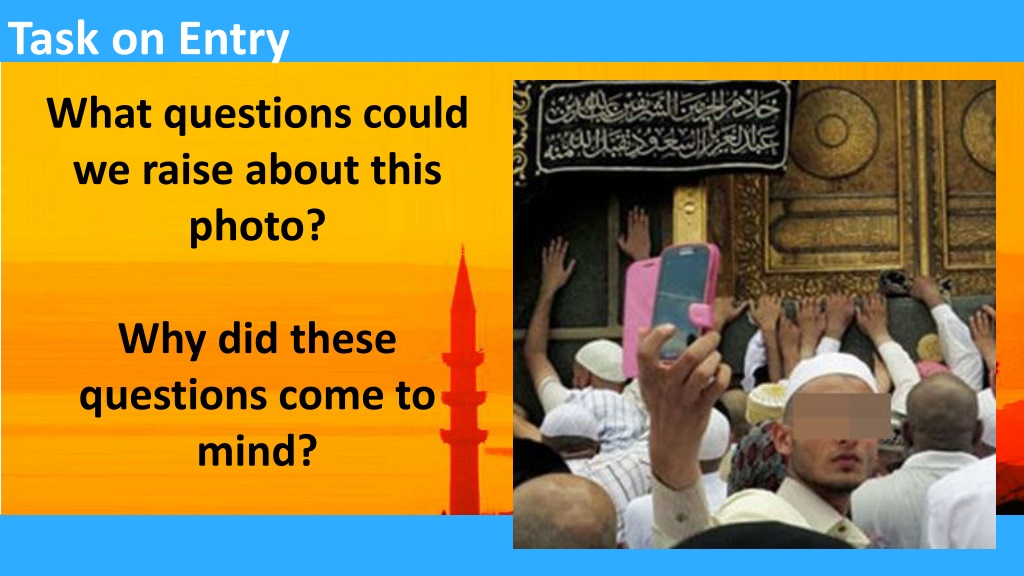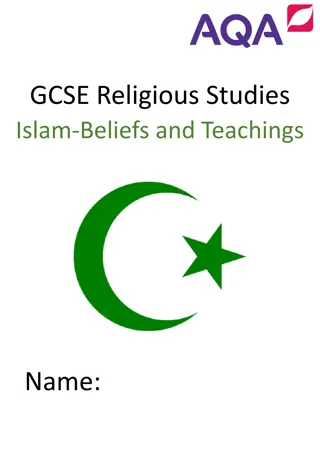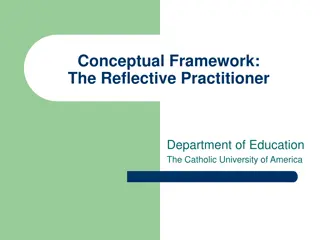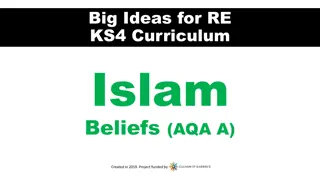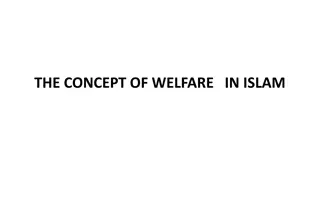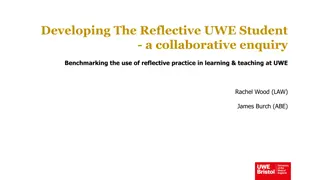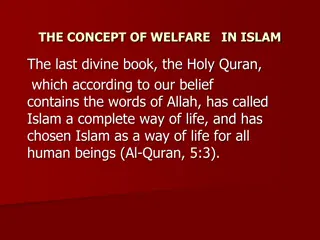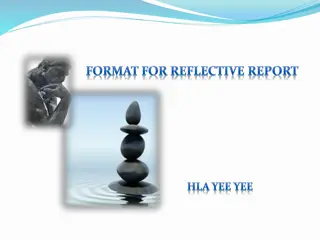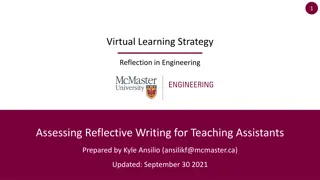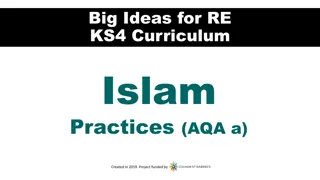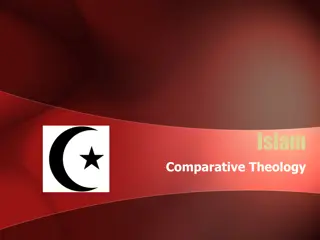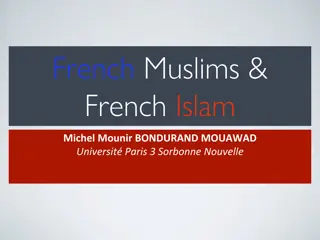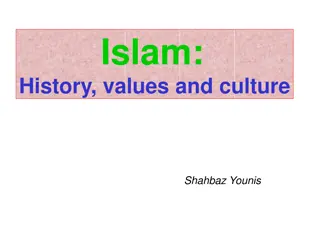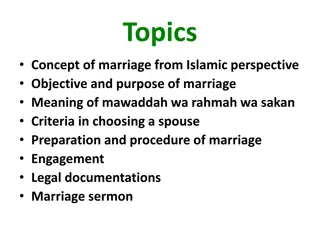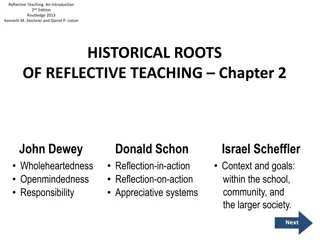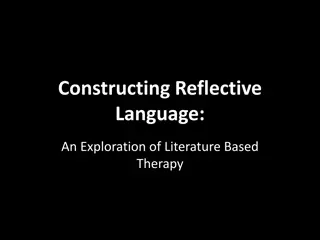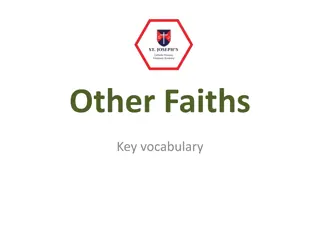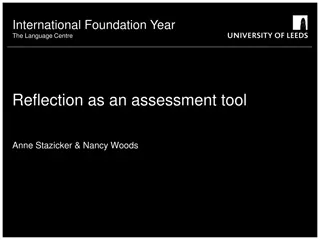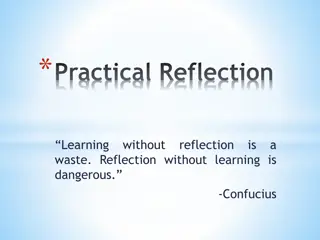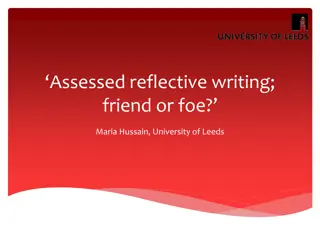Understanding Sincerity in Islam through Reflective Learning Activities
Explore the importance of sincerity in actions as a Muslim through thought-provoking tasks, reflection prompts, and real-life scenarios. Engage in critical thinking, question motivations behind good deeds, and reflect on true intentions. Enhance understanding of sincerity through activities and discussions, culminating in a deeper knowledge of Ikhlas (sincerity) in Islam.
Download Presentation

Please find below an Image/Link to download the presentation.
The content on the website is provided AS IS for your information and personal use only. It may not be sold, licensed, or shared on other websites without obtaining consent from the author. Download presentation by click this link. If you encounter any issues during the download, it is possible that the publisher has removed the file from their server.
E N D
Presentation Transcript
Task on Entry What questions could we raise about this photo? Why did these questions come to mind?
Lesson objectives and outcomes Objective: To understand the importance of sincerity as a Muslim. I can use the Why Approach to create cases about sincerity of actions. I can make links between sincerity and going to Heaven or Hell Excellent I can use sincerity indicators to describe if the action is sincere or not. I can explain sincerity in Islam Good I can describe why sincerity is important. I can identify ways a Muslim can stay sincere in his/her life. OK
Phase 1: Connection Where will you reach? Critical thinking Emerging Expected Exceeding Excelling I can state what I believe in relation to a situation, scenario or outcome. I can reflect on my own beliefs and values. I can reflect and justify my own beliefs and values from a Muslim perspective. I can clearly and fluently articulate my opinions, values and ideas which are valid and justified. I can use my own beliefs to reflect on real life situations while knowing why and how should I be reacting. Articulate self- beliefs and values from a Muslim perspective. Starter
Phase 1: Connection The Big Question Why should I be sincere in all my actions as a Muslim? Starter
Phase 1: Connection Pick 2-3 actions below and in your book explain why these are good deeds Volunteer in charity work Helping a blind man in the street Praying when your parents remind you Helping teacher carry heavy documents Studying for an exam
Phase 1: Connection How would you classify them now? Are they still good deeds? Reflect! Volunteer in charity work Helping a blind man in the street Real intention: I wanted to get extra marks in social studies Real intention: I wanted people to praise me Praying when your parents remind you Real intention: I just want my parents to stop nagging about it Helping teacher carry heavy documents Studying for an exam Real intention: I wanted revenge on the top student in my class Real intention: If the teacher likes me, she ll give me more H.P.
Phase 2: Activation To have a brief idea about Ikhlas (sincerity), lets watch this video together: https://www.youtube.c om/watch?v=CApupCK 4yCk Explore your learning!
Task: Activation Resources Books: pages: 39-40-41-45 Three Key Questions to keep in mind while answering: 1. What is sincerity? 2. Why is it important? 3. How can I know if I m sincere? 4. How can I stay sincere? Further Challenge! (2 H.P. ) Explain what is the link between intention and sincerity. With example. Explore your learning!
Progress check One thing I need to remember from the work I have completed so far is I feel confident about my progress so far in this lesson because The thing I have found most difficult in this lesson so far is A question that I have about today s lesson so far is Pick one statement to complete in your book!
Phase 3: Demonstration (Why Approach) Using the why approach, create a case where a Muslim wasn t completely sincere in his actions, and then add the chain of reasons WHY he shouldn t have done that. Example: Ahmad prayed Sunnah to show off in mosque. (he shouldn t have done that) WHY: because he wasn t sincere. WHY: . Challenge yourself level 1: How long can your chain be? Challenge yourself level 2: Try to use other Wh- questions in your chain! Challenge yourself level 3: Can you do another chain? Link to your real life!
Peer Assessment Use two stars and a wish grid to peer-assess your partner s work. What to look for: Did your partner complete the why approach in a logical way? For example, did they follow the process? Has your partner explained why sincerity is important? How could they have done the work better? Think about detail and presentation, plus use of key terms. Is there a part of the lesson they appeared to not understand/miss? Highlight it for them. Any other comments?
Reflecting on competency Where will you reach? Critical thinking Emerging Expected Exceeding Excelling Articulate self-beliefs and values from a Muslim perspective. I can reflect on my own beliefs and values. I can state what I believe in relation to a situation, scenario or outcome. I can clearly and fluently articulate my opinions, values and ideas which are valid and justified. I can use my own beliefs to reflect on real life situations while knowing why and how should I be reacting. I can reflect and justify my own beliefs and values from a Muslim perspective. Starter
Phase 4: Phase 4: Consolidation Apply your knowledge from the lesson What if somebody has a mixed intention? Will his actions be accepted by Allah (SWT)? Which Islamic Value can we link the lesson to? Why? Extension: UAE martyrs sacrificed their lives while doing their duties, do you think their intention was pure even if they were honored? Reflect on your learning
Phase 4: Phase 4: Consolidation Muslim Tweets! On your post-it note, write down what went good in today s lesson and what you could ve done better. Once you are done tweet it on the Muslim tweet board! Reflect on your learning
Piety "Taqwa" Trust Accountability "Thiqa" "Almas'oliah" Islamic values Integrity Brotherhood "Istiqamah " "Ukhuwah" Fairness "Insaf"
